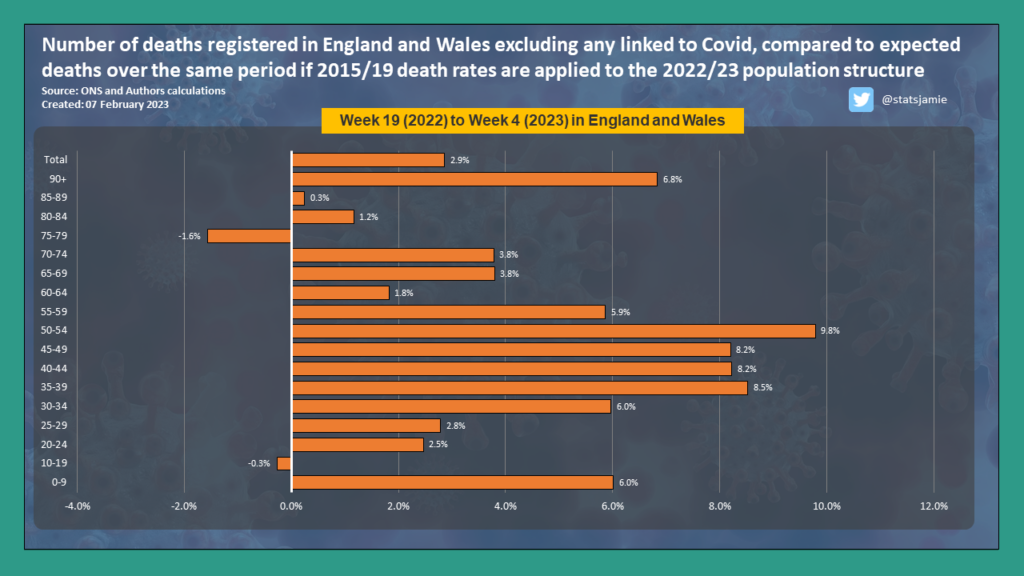Just over three years on from the first registered Covid-19 death in the UK, society has seen an enormous change from the fallout of the pandemic and the Government’s response to managing it. We saw large numbers of deaths in the Spring of 2020 and Autumn/Winter of 2021 as the early variants of Covid ended many elderly lives prematurely. But in 2022 we saw the return of higher-than-expected deaths, even when the number of deaths linked to Covid was low. So why is the UK Government hesitant to investigate excess deaths?
Over 30 thousand excess deaths over 38 weeks
I wrote last summer that we were experiencing higher-than-expected deaths, in particular among those aged 30-59. While we did not have data on the cause by age group, data for all age group indicated that heart issues were a factor. Since then we have continued seeing excess deaths as highlighted regularly through my Twitter feed.
From week 19 of 2022 through to week 4 of 2023, we have seen 38 weeks of excess deaths, equating to 57 thousand more deaths registered than the corresponding weeks across the five-year average of 2015-19. But as we have an ageing population, in particular, a cohort of people born after the second world war hitting the age where many will die, even if there was no pandemic, we would expect more deaths now than the average of 2015/19. To overcome changing population structure, I have calculated death rates by age group and sex over the period 2015/19 and applied them to the 2022/23 population to estimate expected deaths. After this adjustment, we have still seen just over 30 thousand excess deaths in 38 week period.
Non-covid excess deaths among those aged 35 to 54 around 8-10% above expectation
Covid still exists among us, although the variant Omicron is acknowledged as a milder strain. We have seen further waves of the virus over the 38 weeks, albeit much smaller and with fewer deaths. If we strip out any deaths linked to Covid and look at the total number of deaths over the 38-week period, we continue to see higher than expected deaths across many age groups, in particular those aged 35 to 54.

UK Government has ‘made no specific assessment’ of non-Covid excess deaths
There will be no single explanation to explain why we are seeing higher-than-expected deaths across the country but what is alarming is the Government seems hesitant to investigate excess deaths. Lord Strathcarron asked the Government a question related to non-Covid excess deaths to which Lord Markham replied ‘We have made no specific assessment’ before citing some likely explanations.


Multiple factors are at play yet the Government has not made an assessment
Understanding the key factors of non-Covid excess deaths over the past 38 weeks is complex. Lifestyles impacted by the pandemic, for example, increasing alcohol consumption, and putting on weight may have lowered the overall quality of health across the nation in recent years which could be a factor.
We have seen higher-than-expected deaths at a time when the health system in the UK is performing poorly. Ambulance response times for the most serious calls are well above target, which will kill people. For those who get to a hospital, there are significant delays in seeing someone, and if a patient needs to be admitted to the wider hospital for care, there are further delays in a transfer to a bed. Evidence shows these delays raise the level of mortality for those experiencing them.
We know many people stayed away from the NHS in recent years, taking the words ‘Stay Home – Protect the NHS’ to mean do not bother the NHS, with attendance across hospitals down significantly through the pandemic. The numbers waiting to start treatment following a referral have also hit record levels in recent months, with those waiting to start treatment for conditions that are heart-related up 50% when comparing the most recent data to February 2022.
While most people who get a Covid-19 infection recover with no issues, some studies link a previous Covid infection to longer-term cardiovascular complications. What confuses the picture is that some other studies give different conclusions in this area. But we know the vast majority of the population has had at least one Covid-19 infection, so there could be a longer-term factor to consider.
Some commentators link excess deaths to Covid-19 vaccinations, and while most people have no issues following a vaccine, some have adverse reactions. In some rare cases, relative to the number of doses issued, this has involved death. But remember, we are talking about excess deaths in the UK from week 19 of 2022 onwards, and very few people under 50 have had any vaccine doses from January 2022 onwards. So we are not witnessing large numbers of people having a vaccine and dying within days/weeks/months. But what if, like some studies show with Covid itself, there are longer-term health issues from vaccination that could explain excess deaths? If we look internationally, many countries around the world have used Covid-19 vaccinations, and Sweden has a higher vaccination rate across its population than the UK, yet it has one of the lowest excess deaths worldwide. In addition, while Germany is witnessing higher-than-expected deaths, for the ages 40-59, deaths have actually been lower than expected over the past year, whereas for the UK they are higher.
Conclusion
As you can see when you look at different factors at play, there will be no single solution to explain excess deaths and some factors cited by commentators may or may not be factors at all. As a statistician, I like to see conclusive evidence, not contradicted by other evidence when determining what is at play. Without access to patients’ medical records, pathways through the NHS, and knowledge of previous Covid-19 infection and/or vaccination status, it is impossible for me to give a definitive answer as to the specific factor leading to higher-than-expected deaths across some age groups.
But why is the Government so reluctant to do this analysis themselves given they have access to the data? If you look at all the hypotheses put out by various commentators, all can be linked back to the decisions made by the Government over the past three years so perhaps there is a reluctance to admit decisions made by Government, while aiming to save the lives of some, have led to killing others.
Follow me over on Twitter, Instagram, Facebook, Tik Tok, or Gettr for my daily updates, or read my recent blog looking at how the USA had extended the vaccine requirement for foreign nationals to enter.

